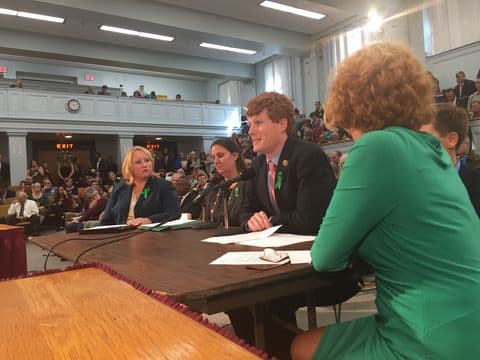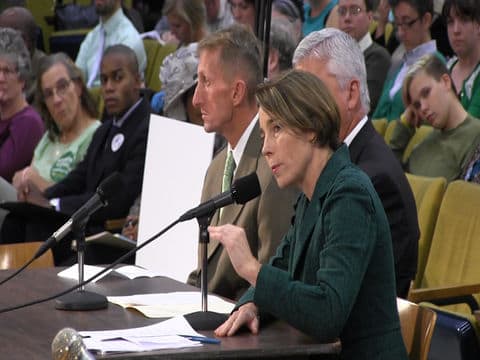Advertisement
Mass. Lawmakers Review Proposals To Expand Legal Protections For Transgender People
Massachusetts lawmakers held a hearing Tuesday to review proposals seeking to expand legal protections for transgender people.
Under review are two bills (H.1577; S. 735) that would increase the scope of anti-discrimination laws to allow trans people access to public areas legally separated by gender, like locker rooms and bathrooms, based on their gender identity.
Essentially, the legislation would make it illegal to bar a transgender man from using a men's locker or restroom. The same principle would apply to transgender women using ladies' rooms.
Massachusetts lawmakers in 2011 passed a law adding transgender individuals to the list of protected classes from employment or housing discrimination, but stopped short of including public accommodations protections. Other states — 17 in total — have passed similar laws offering such expanded protections.

U.S. Rep. Joe Kennedy III said at Tuesday's hearing that Massachusetts should follow suit.
"We are known for pushing our country. So it means something when we don't," Kennedy said. "Today, transgender individuals are protected against discrimination in public accommodations in 17 states, and the District of Columbia. That Massachusetts' name is missing from that list does not go unnoticed."
At the hearing, opponents expressed concerns that the proposed changes would make some people uncomfortable.
"Some students may feel uncomfortable with a transgender student using the same-sex segregating restroom, locker room or changing facilities," said Rep. Jim Lyons, an Andover Republican who opposes the bill. "The discomfort is not a reason to deny access to the transgender student. So my question is, let's reverse it, and let's talk about these young women who do feel uncomfortable with that. What protections are we going to put in place for them?"
Attorney General Maura Healey said discomfort is not a significant enough reason to dismiss the bills.
"Look folks, just remember, we made some changes back a while ago, and after segregation, people were uncomfortable, sharing pools and sharing drinking fountains," she said. "Discomfort is not a reason to perpetuate discrimination, not in this state, not in this country."
Healey said even if a transgender person was discriminated from entering a government building such as the State House "the law isn't going to be there to protect them."

Sen. Sonia Chang-Diaz, testifying on a panel of dozens of lawmakers in support of the bills, tried to turn the tables on Lyons by asking what specific behavior he and other opponents might be in fear of occurring. She said any violation of privacy in a locker room would be "enforced" regardless of whether it came from a transgender person or a straight or gay male or woman.
Healey also said that there is an expectation of proper behavior in locker rooms that should be maintained by all users, but they are not completely private places.
Chang-Diaz, who has sponsored one of the transgender rights bills, said that she finds it "grotesque and insulting" as a woman and a mother to hear opponents say they are trying to protect women and children.
"I'm not trying to insult you or anyone else in any way," said Lyons, who nonetheless raised concerns about a guidance to schools from Education Commissioner Mitchell Chester suggesting it's up to the student themselves to determine their own gender at any given time.
Members of the Judiciary Committee heard from 14-year-old Brandon Adams, of Framingham, who was one of hundreds to testify on Tuesday. Adams was born female, but now identifies as male. Invited by Kennedy to speak, he described what happened when he attended the Christa McAuliffe Charter School in Framingham.
"The school asked me to use restrooms that were segregated from the rest of my classmates. We know from history, that separate but equal rights are unconstitutional. Separate but equal makes me feel like a second-class citizen," he said.
Suffolk District Attorney Dan Conley said the proposal is a "matter of basic human dignity and respect," and said transgender people are "routinely subjected to discrimination and even violence."
Referencing the still unsolved 1998 murder of a transgender woman named Rita Hester, Conley said it is "not enough to light candles."
In 2002, Boston adopted an ordinance to prohibit discrimination based on transgender status, and required public accommodations for transgender individuals.
Boston Police Commissioner William Evans, testifying on behalf of City Hall, said the city's policy has "gone smoothly" and reiterated the testimony of the prosecutors that there have been no instances of men falsely dressing up as women to gain entry to women's bathrooms.
Gov. Charlie Baker said he plans to examine the details of the legislation, and House Speaker Robert Deleo said he wants to discuss the bills with members, before bringing them up in the House.
With reporting from WBUR's Steve Brown and the State House News Service.